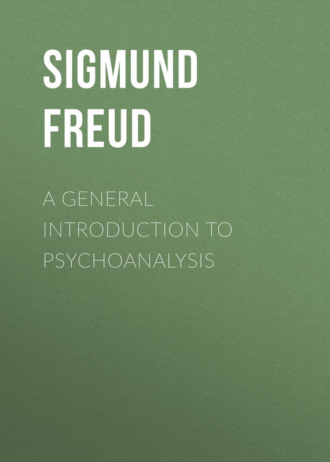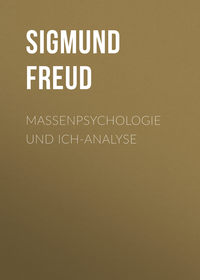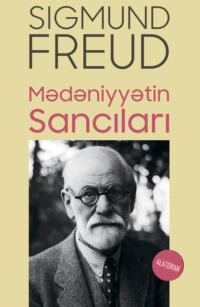 полная версия
полная версияA General Introduction to Psychoanalysis
The full strength of the libido, as well as the entire resistance against it, is concentrated in this relationship to the physician; so it is inevitable that the symptoms of the libido should be laid bare. In place of his original disturbance the patient manifests the artificially constructed disturbance of transference; in place of heterogeneous unreal objects for the libido you now have only the person of the physician, a single object, which, however, is also fantastic. The new struggle over this object is, however, raised to the highest psychic level with the aid of the physician's suggestions, and proceeds as a normal psychic conflict. By avoiding a new suppression the estrangement between the ego and the libido comes to an end, the psychic unity of the personality is restored. When the libido again becomes detached from the temporary object of the physician it cannot return to its former objects, but is now at the disposal of the ego. The forces we have overcome in the task of therapy are on the one hand the aversion of the ego for certain directions of the libido, which had expressed itself as a tendency to suppression, and on the other hand the tenacity of the libido, which is loathe to leave an object which it has once occupied.
Accordingly the work of therapy falls into two phases: first, all the libido is forced from the symptoms into the transference, and concentrated there; secondly, the struggle over this new object is carried on and the libido set free. The decisive change for the better in this renewed conflict is the throwing out of the suppression, so that the libido cannot this time again escape the ego by fleeing into the unconscious. This is accomplished by the change in the ego under the influence of the physician's suggestion. In the course of the work of interpretation, which translates unconscious into conscious, the ego grows at the expense of the unconscious; it learns forgiveness toward the libido, and becomes inclined to permit some sort of satisfaction for it. The ego's timidity in the face of the demands of the libido is now lessened by the prospect of occupying some of the libido through sublimation. The more the processes of the treatment correspond to this theoretic description the greater will be the success of psychoanalytic therapy. It is limited by the lack of mobility of the libido, which can stand in the way of releasing its objects, and by the obstinate narcism which will not permit the object-transference to effect more than just so much. Perhaps we shall obtain further light on the dynamics of the healing process by the remark that we are able to gather up the entire libido which has become withdrawn from the control of the ego by drawing a part of it to ourselves in the process of transference.
It is to be remembered that we cannot reach a direct conclusion as to the disposition of the libido during the disease from the distributions of the libido which are effected during and because of the treatment. Assuming that we have succeeded in curing the case by means of the creation and destruction of a strong father-transference to the physician, it would be wrong to conclude that the patient had previously suffered from a similar and unconscious attachment of his libido to his father. The father-transference is merely the battlefield upon which we were able to overcome the libido; the patient's libido had been concentrated here from its other positions. The battlefield need not necessarily have coincided with the most important fortresses of the enemy. Defense of the hostile capital need not take place before its very gates. Not until we have again destroyed the transference can we begin to reconstruct the distribution of the libido that existed during the illness.
From the standpoint of the libido theory we might say a last word in regard to the dream. The dreams of neurotics, as well as their errors and haphazard thoughts, help us in finding the meaning of the symptoms and in discovering the disposition of the libido. In the form of the wish fulfillment they show us what wish impulses have been suppressed, and to what objects the libido, withdrawn from the ego, has been attached. That is why interpretation of dreams plays a large role in psychoanalytic treatment, and is in many cases, for a long time, the most important means with which we work. We already know that the condition of sleep itself carries with it a certain abatement of suppressions. Because of this lessening of the pressure upon it, it becomes possible for the suppressed impulse to create in the dream a much clearer expression than the symptom can furnish during the day. So dream-study is the easiest approach to a knowledge of the libidinous suppressed unconscious which has been withdrawn from the ego.
Dreams of neurotics differ in no essential point from the dreams of normal persons; you might even say they cannot be distinguished. It would be unreasonable to explain the dreams of the nervous in any way which could not be applied to the dreams of the normal. So we must say the difference between neurosis and health applies only during the day, and does not continue in dream life. We find it necessary to attribute to the healthy numerous assumptions which have grown out of the connections between the dreams and the symptoms of the neurotic. We are not in a position to deny that even a healthy man possesses those factors in his psychic life which alone make possible the development of the dream and of the symptom as well. We must conclude, therefore, that the healthy have also made use of suppressions and are put to a certain amount of trouble to keep those impulses under control; the system of their unconscious, too, conceals impulses which are suppressed, yet are still possessed of energy, and a part of their libido is also withdrawn from the control of their ego. So the healthy man is virtually a neurotic, but dreams are apparently the only symptoms which he can manifest. Yet if we subject our waking hours to a more penetrating analysis we discover, of course, that they refute this appearance and that this seemingly healthy life is shot through with a number of trivial, practically unimportant symptom formations.
The difference between nervous health and neurosis is entirely a practical one which is determined by the available capacity for enjoyment and accomplishment retained by the individual. It varies presumably with the relative proportion of the energy totals which have remained free and those which have been bound by suppressions, and is quantitative rather than qualitative. I do not have to remind you that this conception is the theoretical basis for the certainty that neuroses can be cured, despite their foundation in constitutional disposition.
This is accordingly what we may make out of the identity between the dreams of the healthy and those of the neurotic for the definition of health. As regards the dream itself, we must note further that we cannot separate it from its relation to neurotic symptoms. We must recognize that it is not completely defined as a translation of thoughts into an archaic form of expression, that is, we must assume it discloses a disposition of libido and of object-occupations which have actually taken place.
We have about come to the end. Perhaps you are disappointed that I have dealt only with theory in this chapter on psychoanalytic therapy, and have said nothing concerning the conditions under which the cure is undertaken, or of the successes which it achieves. But I shall omit both. I shall omit the first because I had intended no practical training in the practice of psychoanalysis, and I shall neglect the second for numerous reasons. At the beginning of our talks I emphasized the fact that under favorable circumstances we attain results which can be favorably compared with the happiest achievements in the field of internal therapy, and, I may add, these results could not have been otherwise achieved. If I were to say more I might be suspected of wishing to drown the voices of disparagement, which have become so loud, by advertising our claims. We psychoanalysts have repeatedly been threatened by our medical colleagues, even in open congresses, that the eyes of the suffering public must be opened to the worthlessness of this method of treatment by a statistical collection of analytic failures and injuries. But such a collection, aside from the biased, denunciatory character of its purpose, would hardly be able to give a correct picture of the therapeutic values of analysis. Analytic therapy is, as you know, still young; it took a long time to establish the technique, and this could be done only during the course of the work and under the influence of accumulating experience. As a result of the difficulties of instruction the physician who begins the practice of psychoanalysis is more dependent upon his capacity to develop on his own account than is the ordinary specialist, and the results he achieves in his first years can never be taken as indicative of the possibilities of analytic therapy.
Many attempts at treatment failed in the early years of analysis because they were made on cases that were not at all suited to the procedure, and which today we exclude by our classification of symptoms. But this classification could be made only after practice. In the beginning we did not know that paranoia and dementia praecox are, in their fully developed phases, inaccessible, and we were justified in trying out our method on all kinds of conditions. Besides, the greatest number of failures in those first years were not due to the fault of the physician or because of unsuitable choice of subjects, but rather to the unpropitiousness of external conditions. We have hitherto spoken only of internal resistances, those of the patient, which are necessary and may be overcome. External resistances to psychoanalysis, due to the circumstances of the patient and his environment, have little theoretical interest, but are of great practical importance. Psychoanalytic treatment may be compared to a surgical operation, and has the right to be undertaken under circumstances favorable to its success. You know what precautions the surgeon is accustomed to take: a suitable room, good light, assistance, exclusion of relatives, etc. How many operations would be successful, do you think, if they had to be performed in the presence of all the members of the family, who would put their fingers into the field of operation and cry aloud at every cut of the knife? The interference of relatives in psychoanalytical treatment is a very great danger, a danger one does not know how to meet. We are armed against the internal resistances of the patient which we recognize as necessary, but how are we to protect ourselves against external resistance? It is impossible to approach the relatives of the patient with any sort of explanation, one cannot influence them to hold aloof from the whole affair, and one cannot get into league with them because we then run the danger of losing the confidence of the patient, who rightly demands that we in whom he confides take his part. Besides, those who know the rifts that are often formed in family life will not be surprised as analysts when they discover that the patient's nearest relatives are less interested in seeing him cured than in having him remain as he is. Where, as is so often the case, the neurosis is connected with conflicts with members of the family, the healthy member does not hesitate long in the choice between his own interest and that of the cure of the patient. It is not surprising if a husband looks with disfavor upon a treatment in which, as he may correctly suspect, the register of his sins is unrolled; nor are we surprised, and surely we cannot take the blame, when our efforts remain fruitless and are prematurely broken off because the resistance of the husband is added to that of the sick wife. We had only undertaken something which, under the existing circumstance, it was impossible to carry out.
Instead of many cases, I shall tell you of just one in which, because of professional precautions, I was destined to play a sad role. Many years ago I treated a young girl who for a long time was afraid to go on the street, or to remain at home alone. The patient hesitatingly admitted that her phantasy had been caused by accidentally observing affectionate relations between her mother and a well-to-do friend of the family. But she was so clumsy – or perhaps so sly – as to give her mother a hint of what had been discussed during the analysis, and changed her behavior toward her mother, insisting that no one but her mother should protect her against the fear of being alone, and anxiously barring the way when her mother wished to leave the house. The mother had previously been very nervous herself, but had been cured years before in a hydropathic sanatorium. Let us say, in that institution she made the acquaintance of the man with whom she was to enter upon the relationship which was able to satisfy her in every respect. Becoming suspicious of the stormy demands of the girl, the mother suddenly realized the meaning of her daughter's fear. She must have made herself sick to imprison her mother and to rob her of the freedom she needed to maintain relations with her lover. Immediately the mother made an end to the harmful treatment. The girl was put into a sanatorium for the nervous and exhibited for many years as "a poor victim of psychoanalysis." For just as long a period I was pursued by evil slander, due to the unfavorable outcome of this case. I maintained silence because I thought myself bound by the rules of professional discretion. Years later I learned from a colleague who had visited the institution, and had seen the agoraphobic girl there, that the relationship between the mother and the wealthy friend of the family was known all over town, and apparently connived at by the husband and father. It was to this "secret" that our treatment had been sacrificed.
In the years before the war, when the influx of patients from all parts made me independent of the favor or disfavor of my native city, I followed the rule of not treating anyone who was not sui juris, was not independent of all other persons in his essential relations of life. Every psychoanalyst cannot do this. You may conclude from my warning against the relatives of patients that for purposes of psychoanalysis we should take the patients away from their families, and should limit this therapy to the inmates of sanatoriums. I should not agree with you in this; it is much more beneficial for the patients, if they are not in a stage of great exhaustion, to continue in the same circumstances under which they must master the tasks set for them during the treatment. But the relatives ought not to counteract this advantage by their behavior, and above all, they should not antagonize and oppose the endeavors of the physician. But how are we to contend against these influences which are so inaccessible to us! You see how much the prospects of a treatment are determined by the social surroundings and the cultural conditions of a family.
This offers a sad outlook indeed for the effectiveness of psychoanalysis as a therapy, even if we can explain the great majority of our failures by putting the blame on such disturbing external factors! Friends of analysis have advised us to counterbalance such a collection of failures by means of a statistical compilation on our part of our successful cases. Yet I could not try myself to do this. I tried to explain that statistics would be worthless if the collected cases were not comparable, and in fact, the various neuroses which we have undertaken to treat could, as a matter of fact, hardly be compared on the same basis, since they differed in many fundamental respects. Besides, the period of time over which we could report was too short to permit us to judge the permanency of our cures, and concerning certain cases we could not have given any information whatever. They related to persons who had kept their ailments, as well as their treatment, secret, and whose cure must necessarily be kept secret as well. The strongest hindrance, however, lay in the knowledge that men behave most irrationally in matters of therapy, and that we have no prospect of attaining anything by an appeal to reason. A therapeutic novelty is received either with frenzied enthusiasm, as was the case when Koch first made public his tuberculin against tuberculosis, or it is treated with abysmal distrust, as was the really blessed vaccination of Jenner, which even today retains implacable opponents. There was a very obvious prejudice against psychoanalysis. When we had cured a very difficult case we would hear it said: "That is no proof, he would have become well by himself in all this time." Yet when a patient who had already gone through four cycles of depression and mania came into my care during a temporary cessation in the melancholia, and three weeks later found herself in the beginnings of a new attack, all the members of the family as well as the high medical authorities called into consultation, were convinced that the new attack could only be the result of the attempted analysis. Against prejudice we are powerless; you see it again in the prejudices that one group of warring nations has developed against the other. The most sensible thing for us to do is to wait and allow time to wear it away. Some day the same persons think quite differently about the same things than before. Why they formerly thought otherwise remains the dark secret.
It may be possible that the prejudice against psychoanalysis is already on the wane. The continual spread of psychoanalytic doctrine, the increase of the number of physicians in many lands who treat analytically, seems to vouch for it. When I was a young physician I was caught in just such a storm of outraged feeling of the medical profession toward hypnosis, treatment by suggestion, which today is contrasted with psychoanalysis by "sober" men. Hypnotism did not, however, as a therapeutic agent, live up to its promises; we psychoanalysts may call ourselves its rightful heirs, and we have not forgotten the large amount of encouragement and theoretical explanation we owe to it. The injuries blamed upon psychoanalysis are limited essentially to temporary aggravation of the conflict when the analysis is clumsily handled, or when it is broken off unfinished. You have heard our justification for our form of treatment, and you can form your own opinion as to whether or not our endeavors are likely to lead to lasting injury. Misuse of psychoanalysis is possible in various ways; above all, transference is a dangerous remedy in the hands of an unconscientious physician. But no professional method of procedure is protected from misuse; a knife that is not sharp is of no use in effecting a cure.
I have thus reached the end, ladies and gentlemen. It is more than the customary formal speech when I admit that I am myself keenly depressed over the many faults in the lectures I have just delivered. First of all, I am sorry that I have so often promised to return to a subject only slightly touched upon at the time, and then found that the context has not made it possible to keep my word. I have undertaken to inform you concerning an unfinished thing, still in the process of development, and my brief exposition itself was an incomplete thing. Often I presented the evidence and then did not myself draw the conclusion. But I could not endeavor to make you masters of the subject. I tried only to give you some explanation and stimulation.
END1
"Fehl-leistungen."
2
In the German, the correct announcement is, "Connetable schickt sein Schwert zurück." The novice, as a result of the suggestion, announced instead that "Komfortabel schickt sein Pferd zurück."
3
"Aufstossen" instead of "anstossen."
4
"Begleit-digen" compounded of "begleiten" and "beleidigen."
5
"Briefkasten" instead of "Brütkasten."
6
"Geneigt" instead of "geeignet."
7
"Versuchungen" instead of "Versuche."
8
"Aufgepatzt" instead of "aufgeputzt."
9
"Angenommen" is a verb, meaning "to accept."
10
The young man here said "aufzustossen" instead of "anzustossen."
11
Prof. Freud here gives the two examples, quite untranslatable, of "apopos" instead of "apropos," and "eischeiszwaibehen" instead of "eiweiszscheibehen."
12
From C. G. Jung.
13
From A. A. Brill.
14
From B. Dattner.
15
So also in the writings of A. Maeder (French), A. A. Brill (English) J. Stärke (Dutch) and others.
16
From R. Reitler.
17
In the German Reichstag, November, 1908. "Rückhaltlos" means "unreservedly." "Rückgratlos" means "without backbone."
18
"Zum Vorschein bringen," means to bring to light. "Schweinereien" means filthiness or obscurity. The telescoping of the two ideas, resulting in the word "Vorschwein," plainly reveals the speaker's opinion of the affair.
19
The lady meant to say "Nach Hause," "to reach home." The word "Hose" means "drawers." The preservating content of her hesitancy is hereby revealed.
20
The German reads, "bei meinen Versuchen an Mausen," which, through the slip of the pen, resulted in "bei meinen Versuchen an Menschen."
21
"Angenommen" is a verb, meaning "to accept."
22
Josef Breuer, in the years 1880-1882. Cf. also my lectures on psychoanalysis, delivered in the United States in 1909.
23
The reader will recall the example: "things were re-filled."
24
From the sublime to the ridiculous is but a narrow passage.
25
Yes, the passage from Calais.
26
"Vorzug." "Vom Bett hervorziehen."
27
"Schränkt sich ein."
28
In Germany tickets may be bought before the day of the performance only upon additional payment, over and above the regular cost of the ticket. This is called "Vorverkaufsgebühr."
29
See frontispiece
30
"steigen."
31
"den Frauen nachsteigen," and "ein alter Steiger."
32
"besitzen," to straddle.
33
While revising these pages I chanced upon a newspaper article that I quote here as an unexpected supplement to the above lines.
THE PUNISHMENT OF GODA BROKEN ARM FOR BROKEN FAITHMrs. Anna M. the wife of a soldier in the reserve accused Mrs. Clementine C. of being untrue to her husband. The accusation reads that Mrs. C. had carried on an illicit relationship with Karl M. while her own husband was on the battlefield, from which he even sent her 70 Kronen a month. Mrs. C. had received quite a lot of money from the husband of the plaintiff, while she and her children had to live in hunger and in misery. Friends of her husband had told her that Mrs. C. had visited inns with M. and had caroused there until late at night. The accused had even asked the husband of the plaintiff before several infantrymen whether he would not soon get a divorce from his "old woman" and live with her. Mrs. C.'s housekeeper had also repeatedly seen the husband of the plaintiff in her (Mrs. C.'s) apartment, in complete negligée.
Yesterday Mrs. C. denied before a judge in Leopoldstadt that she even knew M; there could be no question of intimate relation between them.
The witness, Albertine M., however, testified that Mrs. C. had kissed the husband of the plaintiff and that she had surprised them at it.
When M. was called as a witness in an earlier proceeding he had denied any intimate relation to the accused. Yesterday the judge received a letter in which the witness retracts the statement he made in the first proceeding and admits that he had carried on a love affair with Mrs. C., until last June. He says that he only denied this relationship in the former proceeding for the sake of the accused because before the proceeding she had come to him and begged on her knees that he should save her and not confess. "To-day," wrote the witness, "I felt impelled to make a full confession to the court, since I have broken my left arm and this appears to me as the punishment of God for my transgression."









